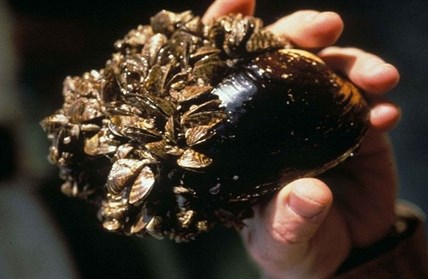
Zebra mussel
Image Credit: SOURCE/ Wikimedia Commons
July 18, 2013 - 1:21 PM
VERNON - North Okanagan politicians are being urged to take action before an invasive species takes up residency in the region's lakes.
Heather Larratt, a marine biologist working with the Okanagan Basin Water Board, told Regional DIstrict of North Okanagan directors Wednesday that zebra and quagga mussels could cost them $43 million per year, and hurt the tourism sector, if they colonize these waters.
"This (species) is a big deal, nothing we've ever seen before," Larratt said, adding it's the marine equivalent of the mountain pine beetle.
The mussels migrate by hitching rides on boats, waders, paddle boards—essentially anything that touches the water. On some surfaces, they can survive for a month out of water.
"Your pet poodle could move the species," Larratt said.
And the same mineral that gives Kalamalka Lake it's green glimmer—calcium— is the one these mussels thrive the most in.
After testing many strategies for decontaminating watercrafts, Larratt said the 'Clean, Drain, Dry' method has proven most effective. It involves rinsing with a mixture of bleach and other cleaning agents, draining the boat's bilge where mussels tend to hide out, and letting everything dry thoroughly.
"A certain percentage of people will just do it," Larratt said. "Some people will need more incentive."
Once a lake is infested with the mussels, other species get choked out and water supply pipes get damaged. Larratt pointed out that Kalamalka Lake is a main water source for many residents who would be plagued by damaged infrastructure.
Board chair Patrick Nicol said a study several years ago showed 70 per cent of the region's population own some form of watercraft, and wondered if the invasion isn't a question of if, but when.
"There is reason and hope that people will change their behaviours," Larratt said, adding that every year the Okanagan blockades the mussels, it will save millions of dollars. And if they can buy some time for research to progress, Larratt said options and solutions might improve in years ahead.
"Right now, B.C. is clear, and that's how we want to keep it," Larratt said, adding other provinces, like Quebec and Ontario already have the mussel, and aren't as invested in a national preventative approach.
Director Juliette Cunningham sits on the Okanagan Basin Water Board, and says the mussel is a constant topic at meetings.
"I just think it's one of the things we can't let up on. I've been disappointed with responses from the government, I don't think they're taking this seriously," Cunningham said.
Directors will be sending a letter to the federal government, and copying Okanagan-Shuswap MP Colin Mayes, asking for action to be taken against the mussel. While there are already educational signs at boat launches, director Mike MacNabb would also like to see them at hand launches as well.
To contact the reporter for this story, email Charlotte Helston at chelston@infotelnews.ca, call (250)309-5230 or tweet @charhelston.
News from © iNFOnews, 2013